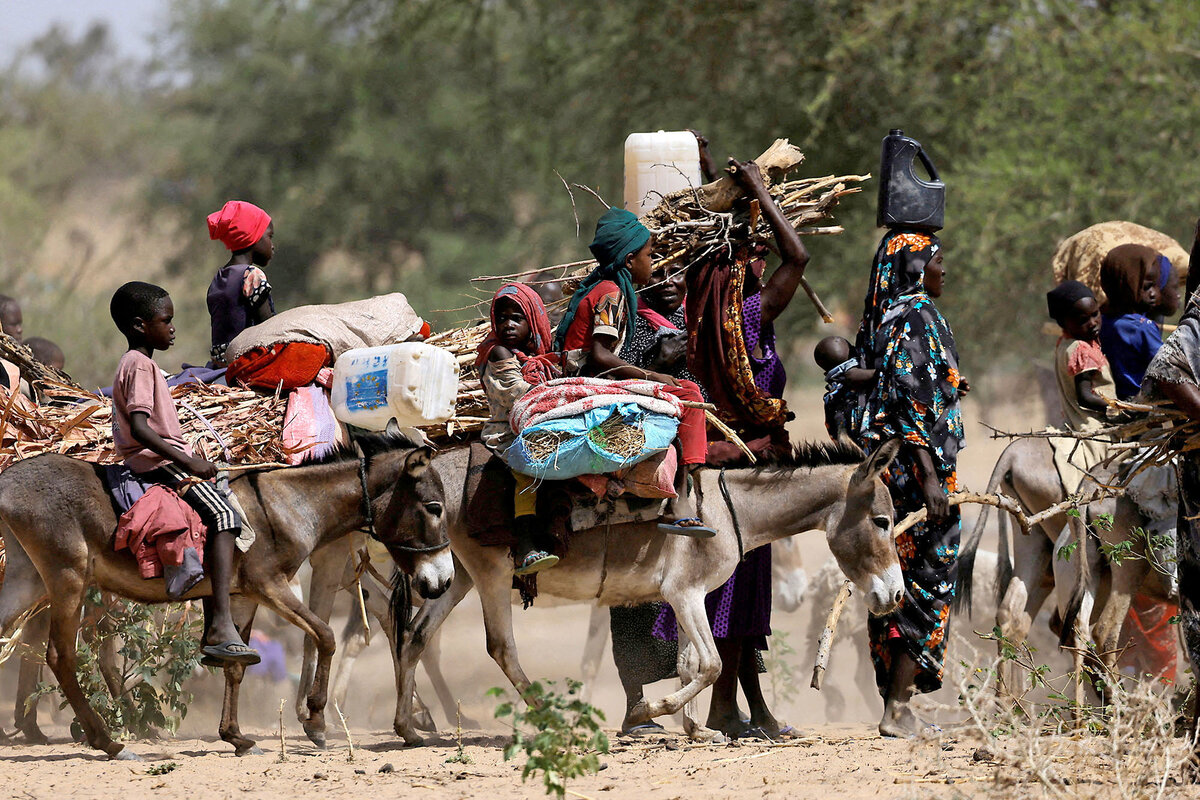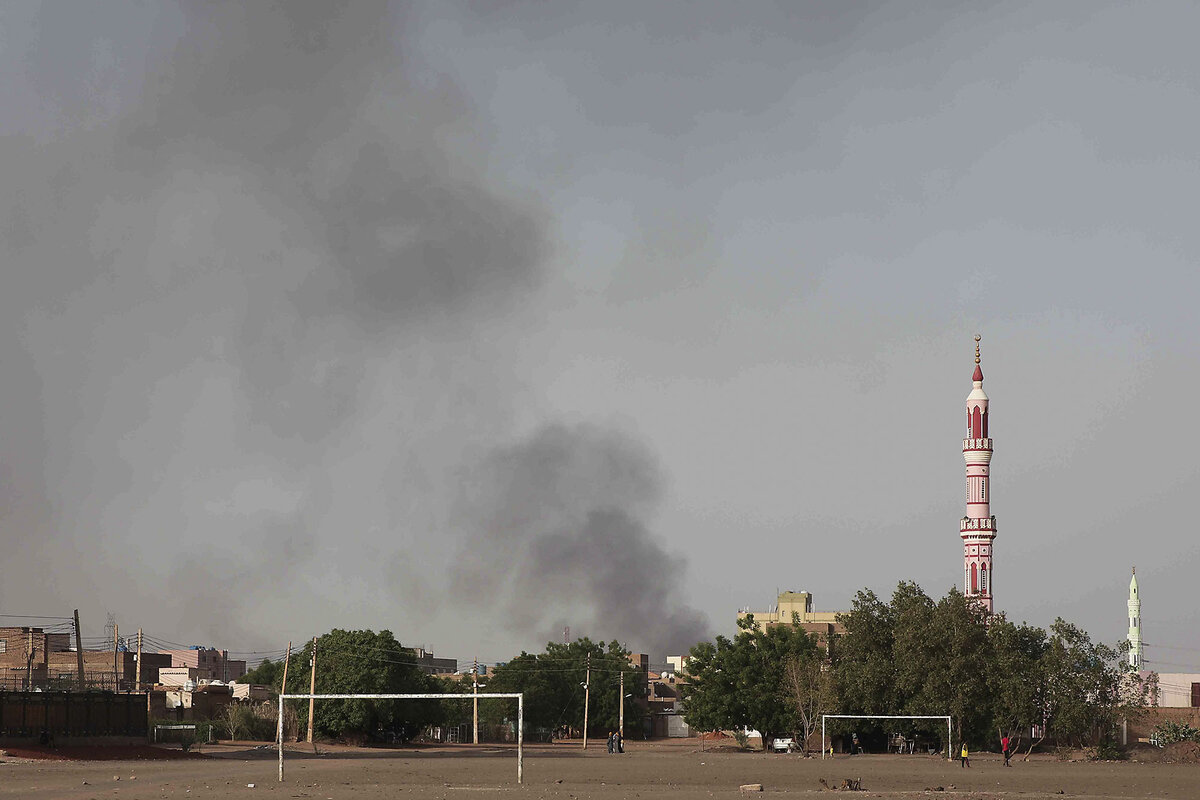As genocide threatens again, the world wakes up to Sudan’s civil war
| London
The American diplomat could not have been clearer: This war must end, he said. “We need to be seeing massive convoys of aid” for its desperately vulnerable civilians.
He was not talking about Gaza.
Veteran U.S. diplomat Tom Perriello was addressing another conflict, 1,300 miles to the south, in the strategically important east African state of Sudan. That civil war, between two rival military leaders, has been brutal, and the humanitarian crisis even more devastating than in Gaza.
Why We Wrote This
A story focused onAfter months of indifference, Washington and its allies are making a new bid to end Sudan’s civil war. The humanitarian costs and geopolitical risks are too high, as genocide threatens and Russia makes inroads.
Yet it has been largely forgotten, overshadowed by the Israel-Hamas war and Ukraine’s fight against Russia’s invasion.
Until now.
After months of policy drift, Washington and a range of international allies are showing signs of trying again to end the year-old war in Sudan.
They know it won’t be easy. But they also know that the humanitarian cost of failure is rising. About half of Sudan’s 50 million people are in “dire need” of assistance, the United Nations says, including more than 14 million children. More than 9 million people have been forced to flee their homes.
And, ominously, the same forces that committed genocide in the Darfur region 20 years ago now seem poised to attack the North Darfur capital of Al-Fashir, after reportedly razing villages in the region. The U.S. State Department said Wednesday that it was “alarmed by indications of an imminent offensive” by the Rapid Support Forces (RSF), which has launched a campaign of abductions, sexual assaults, and mass killings.
And the geopolitical cost is rising, too, unsurprisingly, perhaps, given Sudan’s location. It sits directly across the Red Sea from Saudi Arabia and Yemen.
Several outside powers – including Iran, Russia, and the United Arab Emirates – have reportedly been arming the warring forces.
Russia’s role is of special concern to the United States, since Moscow is also providing armed support to a string of military regimes stretching westward from Sudan across Africa to the Atlantic. And Washington is particularly frustrated about the UAE, a key American ally.
But the stakes are highest for the Sudanese, especially those involved in the grassroots protests in 2019 that forced an end to nearly three decades of military rule by President Omar al-Bashir.
Both the warring leaders – Sudanese armed forces commander Gen. Abdel Fattah al-Burhan and Mohamed Hamdan Dagalo of the RSF paramilitary force – served under General Bashir.
The RSF is made up largely of former members of the Janjaweed militia, which carried out the earlier genocide in Darfur and is now unleashing similar violence against non-Arab civilians there.
Aided by Russia and the UAE, the RSF also seems to be gaining the upper hand in the war. Its militias have wrested increasing control not only over Darfur and central Sudan, but also in Sudan’s Nile-side capital, Khartoum.
In the wake of the 2019 protests, Washington, the U.N., and regional mediators saw both rival military commanders as indispensable to negotiations on a transition to civilian democratic government. And they appeared to have accepted that process, albeit reluctantly, until they effectively ended it last April and turned their guns on each other.
The U.S. and other would-be mediators have since intervened only haltingly. But that is beginning to change.
Amid rising bipartisan concern in the U.S. Congress over the RSF’s renewed campaign of violence in Darfur, and the country’s humanitarian emergency, the State Department appointed a special envoy for Sudan in February, Mr. Perriello.
He has sought to bring the weight of America’s diplomatic and economic influence to a fresh attempt to end the fighting, and to ramp up the response to the humanitarian crisis.
At a conference in Paris earlier this month, international donor nations finally made a start on answering long-standing U.N. appeals for a major infusion of relief funds. The meeting ended with pledges totaling around $2 billion.
Afterward, Mr. Perriello confirmed that Saudi Arabia was planning to hold a conference next month in the port city of Jeddah, which he hoped would attract both of Sudan’s warring generals, to make a renewed effort to negotiate an end to the fighting.
Such meetings last year, backed by the U.S., ended without success.
But Washington seems to be putting new urgency into its latest diplomatic effort.
U.S. officials have moved beyond backdoor appeals, publicly calling out both the UAE’s support for the RSF and Iran, which has reportedly provided drones to the Sudanese army.
After the meeting in Paris, Mr. Perriello said both countries were complicit in atrocities being committed against Sudan’s civilians. “Providing weapons to either side ... will deepen and prolong the conflict,” he added.
Washington clearly lacks the kind of leverage in Sudan that it enjoys with its Israeli and Arab allies. But the hope appears to be that it can persuade the UAE to step back, and press for a de-escalation with support from the Saudis and from major African states that are keen to see stability restored to the continent’s third-largest country.
And the worsening situation, especially in Darfur, seems to have persuaded the U.S. that it cannot afford to let Sudan remain a “forgotten war” any longer.








